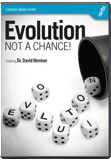
Some evidence and hope that secular publishers may provide creation information
The cracks are beginning to show in the monopoly that evolutionist have had on academic publications.
Recently I have found reason to think and hope that secular publishers (even academic ones) may be starting to provide some information about creation. Specifically, in April 2007, a catalog arrived from the Academic department of a major publisher, Random House, that included some apparent examples of a case for design.1 Along with the standard evolutionary texts from Stephen Jay Gould, Darwin, etc., were a few titles such as Creation, Remarkable Evidence of God’s Design by Grant R. Jeffrey2; The Probability of God, A Simple Calculation That Proves the Ultimate Truth by Stephen D. Unwin3; and God: The Evidence by Patrick Glynn.4 Although only one of these authors was somewhat familiar to me (Jeffrey), I hoped such books might provide at least a slight but noticeable break in the “iron curtain” of modern evolutionary thinking within most secular and academic publishing. As it turns out, such offerings may give reason for hope, but with need for further, more internally consistent books or DVDs, such as those recommended at the end of this article.
I hoped such books might provide at least a slight but noticeable break in the “iron curtain” of modern evolutionary thinking within most secular and academic publishing.
At first, I looked at how the above authors approached evidence for the Creator, starting with Jeffrey. In his book’s acknowledgments, Jeffrey states that “research and documentation of ... recent scientific discoveries ... prove that our universe was intelligently designed and fine-tuned to allow humanity to flourish ... [and] prove that the Bible’s account of Creation is scientifically credible.” He makes a good general case for design (such as the constants of physics that are so amazingly fine-tuned that they allow complex life to exist). His doctorate is in Biblical literature and in talking about the contradiction of many Christians also being evolutionists, warns (pg. 12-14) that “a double-minded man is unstable in all his ways” (James 1:8). He makes a connection between the weakness on origins of North American Christians who “have a fundamentally compromised view of the authority and truthfulness of the Word of God” with the fact that their “personal behavior does not significantly differ from the secular non-Christian world that surrounds” them.
However, not all of Jeffrey’s arguments for the Creator are appropriate. For example, he tends to quote unbiblical timeframes of billions of years and the “Big Bang” without question (e.g. on pg. 87). Furthermore in 1999, Steve Austin and Mark Strauss5 of the Institute for Creation Research wrote that Jeffrey’s end-times claim that “since ... 1900, the growth in [the number of] major earthquakes has been relentless” was incorrect; in fact, Austin and Strauss indicated that the number of earthquakes around the world have probably been declining through recent decades. In other words, Jeffrey’s apologetic from science and logic, although somewhat widely known, has not always been accurate. However, overall he presents many good and thought-provoking evidences for creation, such as the lack of evolutionary transitional fossils, and demonstrates a more scripturally consistent perspective than the other two books.
In The Probability of God, author Unwin3 states that he has a new probability calculation that shows God’s existence is likely. However, he appears to have problems with a scientifically supported creation, or with a creation that would be biblically consistent. For example, although he makes a case that the origin of “the recognition of goodness” without God is unlikely, he claims that scientific information cannot be used to provide evidence for or against the proposition that God exists (pg. 35). In other words, he argues that we can’t make a scientific case for (or against) the Creator. He also assumes that the universe was produced by undirected cosmic evolution, but has to admit that an accidental universe is extremely unlikely: “[If] the values of ... fundamental constants [had] been different by just a few percentage points ... [galaxies] would not have condensed from the primordial soup [of the universe and] ... stars, planets, and ultimately human life would not have appeared” (pg. 23). In an interview in 2005, he also made it clear he is an evolutionist, thinks intelligent design is “naïve,” and believes ID should not be taught in science classes (in a CBC Radio interview).6 Although Unwin may show philosophically that it is more likely than not that God exists, he does not appear to support a creation process, nor even intelligent design concepts.
Glynn, the author of God: The Evidence,4 is a person who was an atheist for years, then became a believer. He writes “the anthropic principle [the concept that the universe looks like it was designed to allow human life and human observers] ... offer[s] as strong an indication as reason and science alone could be expected to provide that God exists” (pg. 55). He also offers evidence that prayer has been shown to help people medically and psychologically. However, he too has problems with theology, for example when he writes (pg. 34), “In the early nineteenth century, many scientists ... computed the age of the earth from the biblical genealogies (modern ‘Creationists’ or ‘young-earth’ theorists try to do this today; however, unlike their predecessors, they do not have the excuse of scientific ignorance to justify such absurdities).” By writing this, he shows he does not have a very open, informed or scripturally-consistent worldview. If you would like to see an alternate and scientific case for a created earth that is just thousands of years old, consistent with the biblical genealogies, see The New Answers Book,7 Unraveling the Origins Controversy,8 or other similar valuable publications.
In conclusion, it is hopeful that there are now at least some relatively open-minded and even some design-supporting books available through the standard secular/academic publishing world. However, such availability should be supplemented by additional, logically consistent and even theologically consistent materials (such as the books and DVD listed below).7, 8, 9 Because of a degree of societal openness and the growing interest and thinking about intelligent design, it is hoped that more such materials will be offered in secular and academic publishers’ catalogs. If so, they probably will receive significant public interest and support. In fact, let’s consider encouraging this trend by obtaining at least some of these kinds of materials from secular publishers when they are fair and courageous enough to sell them.
Footnotes
- Evolutionary Theory & Intelligent Design, Selected Titles from Random House (brochure), Random House Academic Department, New York.
- Grant R. Jeffrey, Creation: Remarkable Evidence of God’s Design, WaterBrook Press (through Random House Academic), 2003.
- Stephen D. Unwin, The Probability of God, A Simple Calculation That Proves the Ultimate Truth, Three Rivers Press (through Random House Academic), 2003.
- Patrick Glynn, God: The Evidence, The Reconciliation of Faith and Reason in a Postsecular World, Three Rivers Press (through Random House Academic), 1999.
- Steven A. Austin and Mark L. Strauss, Earthquakes and the End Times: A Geological and Biblical Perspective, Institute for Creation Research, El Cajon, CA, 1999.
- http://www.stephenunwin.com/html/interview.htm
- Ken Ham (Ed.), The New Answers Book, Master Books, Green Forest, AR, 2006.
- D. A. DeWitt, Unraveling the Origins Controversy, CreationCurriculum.com, Lynchburg, VA, 2007.
- Don DeYoung, Thousands Not Billions (DVD), Master Books, Green Forest, AR, 2005.
Recommended Resources

Answers in Genesis is an apologetics ministry, dedicated to helping Christians defend their faith and proclaim the good news of Jesus Christ.
- Customer Service 800.778.3390
- © 2025 Answers in Genesis



